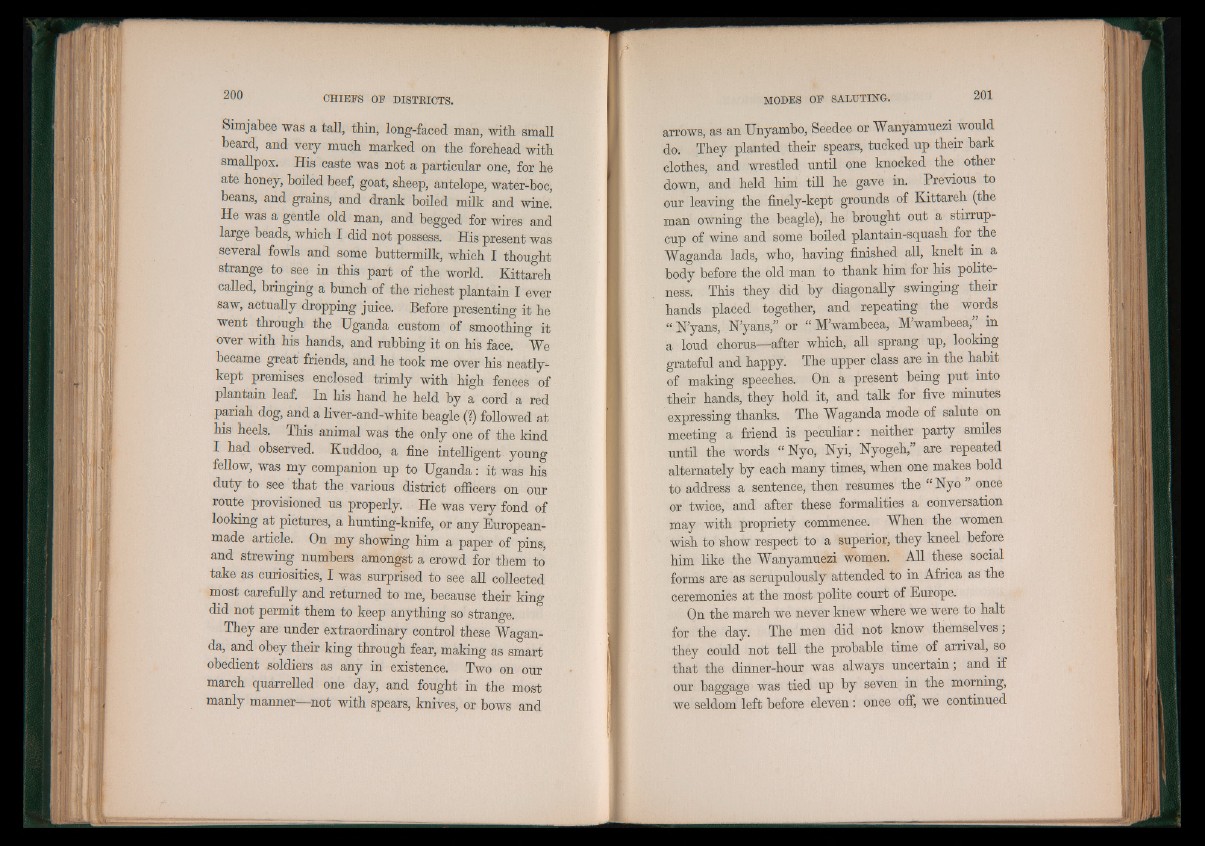
Simjabee was a tall, thin, long-faced man, with small
beard, and very much marked on the forehead with
smallpox. His caste was not a particular one, for he
ate honey, boded beef, goat, sheep, antelope, water-boc,
beans, and grains, and drank boded mdk and wine.
He was a gentle old man, and begged for wires and
large beads, which I did not possess. His present was
several fowls and some buttermdk, which I thought
strange to see in this part of the world. Kittareh
caded, bringing a bunch of the richest plantain I ever
saw, actually dropping juice. Before presenting it he
went through the Uganda custom of smoothing it
over with his hands, and rubbing it on his face. We
became great friends, and he took me over his neatly-
kept premises enclosed trimly with high fences of
plantain leaf. In his hand he held by a cord a red
pariah dog, and a liver-and-white beagle (?) followed at
his heels. This animal was the only one of the kind
I had observed. Kuddoo, a fine intelligent young
fellow, was my companion up to Uganda : it was his
duty to see that the various district officers on our
route provisioned us properly. He was very fond of
looking at pictures, a hunting-knife, or any European-
made article. On my showing him a paper of pins,
and strewing numbers amongst a crowd for them to
take as curiosities, I was surprised to see all collected
most carefully and returned to me, because their king
did not permit them to keep anything so strange.
They are under extraordinary control these Wagan-
da, and obey their king through fear, making as smart
obedient soldiers as any in existence. Two on our
march quarrelled one day, and fought in the most
manly manner—not with spears, knives, or bows and
arrows, as an Unyambo, Seedee or Wanyamuezi would
do. They planted their spears, tucked up their bark
clothes, and wrestled until one knocked the other
down, and held him till he gave in. Previous to
our leaving the finely-kept grounds of Kittareh (the
man owning the beagle), he brought out a stirrup-
cup of wine and some boiled plantain-squash for the
Waganda lads, who, having finished all, knelt in a
body before the old man to thank him for his politeness.
This they did by diagonally swinging their
hands placed together, and repeating the words
“ N’yans, N’yans,” or “ M’wambeea, M’wambeea,” in
a loud chorus—after which, all sprang up, looking
grateful and happy. The upper class are in the habit
of making speeches. On a present being put into
their hands, they hold it, and talk for five minutes
expressing thanks. The Whganda mode of salute on
meeting a friend is peculiar: neither party smiles
until the words “ Nyo, Nyi, Nyogeh,” are repeated
alternately by each many times, when one makes bold
to address a sentence, then resumes the “ Nyo ” once
or twice, and after these formalities a conversation
may with propriety commence. When the women
wish to show respect to a superior, they kneel before
Tiim like the Wanyamuezi women. All these social
forms are as scrupulously attended to in Africa as the
ceremonies at the most polite court of Europe.
On the march we never knew where we were to halt
for the day. The men did not know themselves;
they could not tell the probable time of arrival, so
that the dinner-hour was always uncertain; and if
our baggage was tied up by seven in the morning,
we seldom left before eleven : once off, we continued